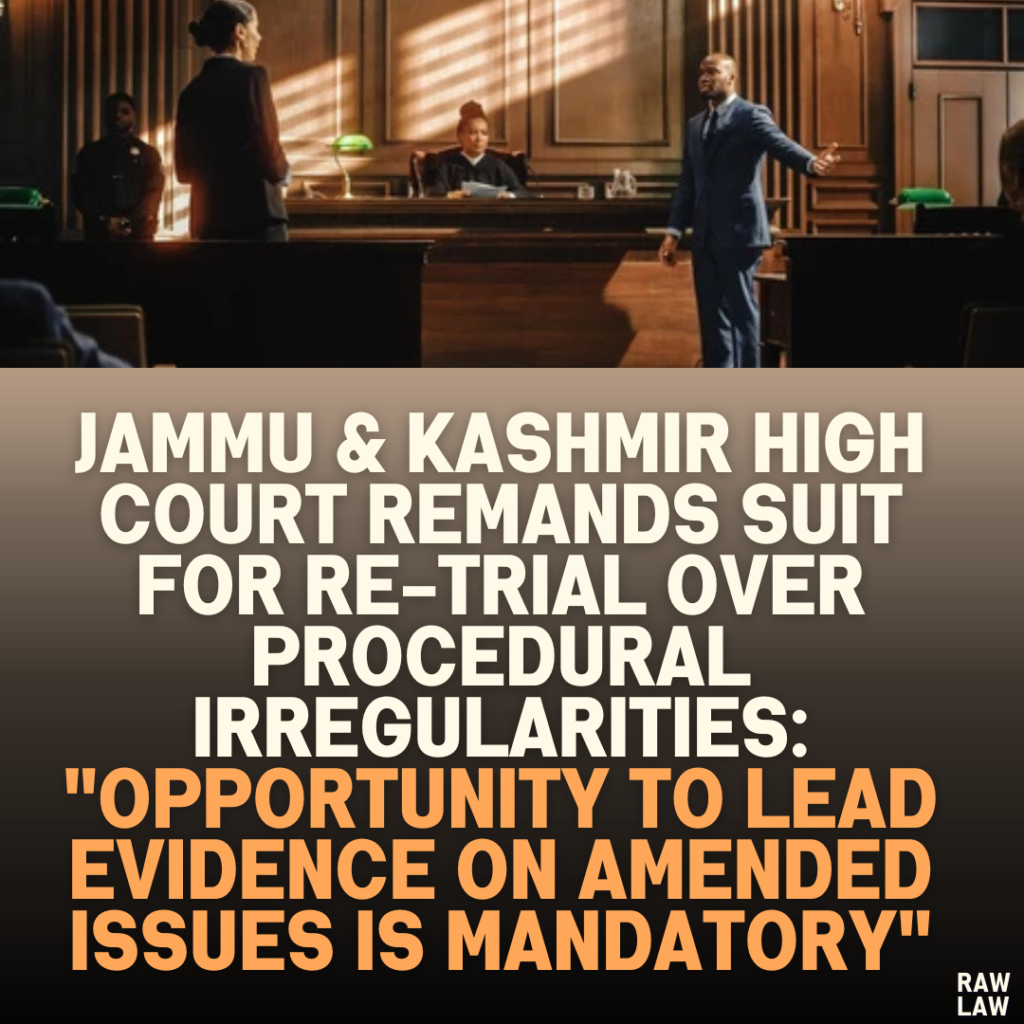Court’s Decision:
The Jammu & Kashmir High Court set aside the judgments and decrees passed by both the trial court and the appellate court in a property dispute. The court ordered that the suit be remanded back to the trial court to be re-tried from the stage of framing of issues. The court held that procedural errors committed by both lower courts deprived the parties of a fair trial. Specifically:
- The trial court amended an issue after closing arguments without allowing the parties to lead evidence or argue on the amended issue.
- The appellate court struck off issues without providing the parties an opportunity to present their case on those issues.
The High Court directed the trial court to restart the case at the stage of framing issues and to ensure all procedural requirements are met.
Facts:
The case involved a dispute over ownership and possession of 2 kanals of land. Key facts included:
- The plaintiff (appellant) claimed ownership and possession of the entire 2 kanals of land. He alleged that the original defendant (predecessor-in-interest of the respondents) had no title to the land but was interfering with his possession.
- The plaintiff admitted to agreeing to sell portions of the land to proforma respondents under agreements dated 10.02.2007 and 15.02.2007.
- The defendant countered that he had purchased one kanal of the land from the plaintiff in 1988 for ₹15,000, providing a receipt for the transaction. He also claimed to have been in possession since then, constructing a boundary wall on the disputed land.
Both the trial court and appellate court ruled against the plaintiff:
- The trial court dismissed the suit, holding that the plaintiff failed to prove possession of the 2 kanals of land.
- The appellate court upheld this decision but struck off issues relating to possession and interference.
The plaintiff filed a second appeal before the High Court, arguing that both lower courts had committed procedural errors and violated principles of fair trial.
Issues:
The following key legal questions arose for consideration:
- Trial Court’s Amendment of Issues:
Whether the trial court erred in modifying issue (i) after the arguments were closed without affording the parties an opportunity to present evidence or arguments on the amended issue. - Appellate Court’s Deletion of Issues:
Whether the appellate court erred in striking off issues (i) and (ii) without allowing the parties to address these changes.
Petitioner’s Arguments:
The appellant contended:
- The trial court acted beyond its jurisdiction by modifying issue (i) after arguments were closed, violating the principles of natural justice.
- The appellate court compounded this error by striking off critical issues without giving the parties an opportunity to be heard.
- Both judgments were contrary to law and resulted in grave prejudice, as the appellant was denied a fair opportunity to substantiate his claims.
Respondent’s Arguments:
The respondents argued:
- The trial court and appellate court had correctly evaluated the evidence on record.
- The plaintiff had already sold part of the disputed land and delivered possession to the defendant.
- The procedural lapses, if any, did not materially affect the outcome of the case, as the evidence clearly supported the respondents’ claims.
Analysis of the Law:
The High Court analyzed the provisions of Order 14 Rule 5 of the Code of Civil Procedure (CPC), which governs the amendment of issues:
- Discretion to Amend Issues:
Order 14 Rule 5 allows a court to amend or frame additional issues at any stage before a decree is passed, provided it is necessary to resolve the dispute between the parties. - Mandatory Opportunity to Parties:
When an issue is amended or added, the court must allow the parties to:- Lead evidence on the amended issue.
- Present arguments addressing the amendment. Similarly, if an issue is deleted, the parties must be given an opportunity to be heard.
The court emphasized that procedural fairness is a fundamental requirement of law and cannot be bypassed.
Precedent Analysis:
The court reiterated established principles of procedural law:
- Fair Opportunity: All parties must be given a fair opportunity to lead evidence and present arguments on any changes to the issues.
- Judicial Discretion: While courts have wide discretion to amend or strike off issues, this power must be exercised judiciously and in a manner that upholds procedural fairness.
Court’s Reasoning:
- Trial Court’s Procedural Error:
The trial court modified issue (i) after the close of arguments without affording the parties an opportunity to lead evidence or argue on the revised issue. This violated principles of natural justice and procedural fairness. - Appellate Court’s Procedural Error:
The appellate court struck off issues (i) and (ii) without allowing the parties to present their arguments. This deprived the plaintiff of the opportunity to substantiate his claims. - Impact of Procedural Errors:
The procedural irregularities in both courts undermined the fairness of the trial. The High Court held that these errors necessitated setting aside the judgments and remanding the matter for re-trial.
Conclusion:
The High Court allowed the appeal and:
- Set aside the judgments and decrees of the trial court and appellate court.
- Directed the trial court to recommence the trial from the stage of framing issues.
- Ordered the parties to maintain the status quo concerning the suit land until they appear before the trial court.
Implications:
- Procedural Fairness:
This judgment reinforces the importance of adhering to procedural safeguards under the CPC, ensuring that all parties are given a fair opportunity to present their case. - Judicial Oversight:
The ruling highlights the judiciary’s role in correcting procedural lapses at lower court levels to uphold justice. - Fair Trial Standards:
The decision emphasizes that even minor procedural irregularities can significantly impact the outcome of a case and must be addressed to ensure a just and equitable trial process.
